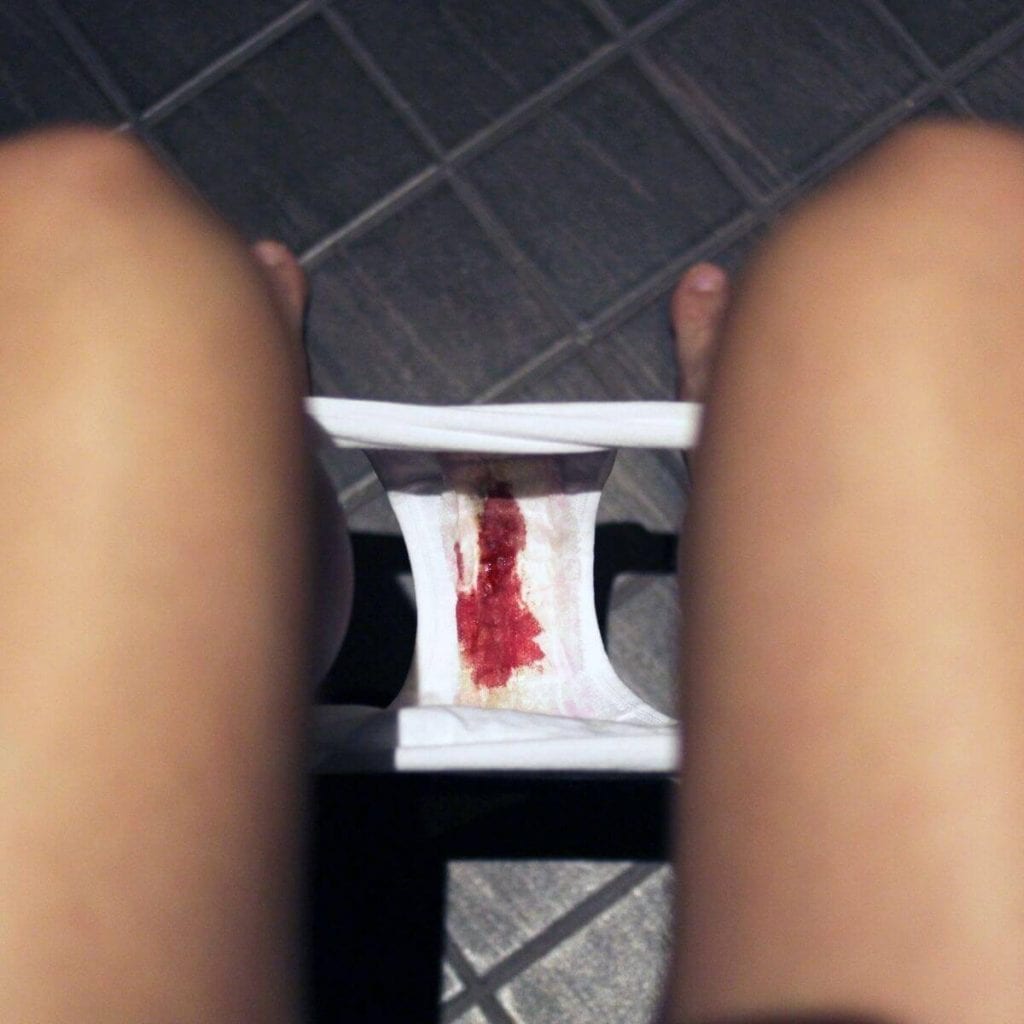When I experienced my first miscarriage, a blighted ovum, I had no idea you could lose a pregnancy without any symptoms whatsoever (a situation called a “missed miscarriage.”) I was nauseous, had food aversions, experienced cravings, had no cramping or bleeding, yet still, and ultrasound confirmed that I had lost a very wanted pregnancy. I was devastated.
But after that loss, I had another. Then another, and another. During my recurrent miscarriage journey, I learned the early signs of miscarriage like they were second nature.
With very early losses, the question often comes up: miscarriage vs period? Which is it?
Here, I’ll help you answer that question, plus figure out what to look for, when to worry, when NOT to worry, and when to call a doctor. Wondering if you’re miscarrying is a scary time, but you’re not alone, mama. I’m here with you!

This site contains affiliate links, meaning that we earn a small commission for purchases made through our site. We only recommend products we personally use, love, or have thoroughly vetted.
What is a miscarriage?
While there are many different types of miscarriage, they all have one thing in common: the unexpected loss of a pregnancy. The word “miscarriage” (a word I hate, by the way) is typically used to refer to a pregnancy lost before 20 weeks gestation; after that point, the loss is considered a stillbirth.
There’s no universal agreement upon what constitutes and “early miscarriage,” but my general experience is that people consider a miscarriage early if it occurs before about 8 weeks gestation.
But there are two things I really want you to know.
1. A Loss is a Loss
It doesn’t matter if you find out you’re pregnant when you realize you’re miscarrying, or if you lose your pregnancy much later. Your experience is valid. If you feel grief, your grief is valid.
People will often make invalidating comments like, “At least you weren’t further along.” It’s the first thing I include when I tell people what not to say to someone who had a miscarriage. These comments are extremely hurtful and often lead us to feel guilt or shame over our own emotions.
I’m here to promise you that if you experience an early miscarriage, you deserve to feel your emotions. You have a right to recognize your loss as a loss. Because it is.
2. How to Determine Week of Pregnancy
We do a weird thing when we start counting how “far along” we are in pregnancy that is completely counterintuitive.
At the time someone sees a positive pregnancy test, they’re usually about 4 weeks pregnant. Even though they would’ve gotten a negative test mere days earlier. Here’s why.
When we count “week pregnant,” the standard is to count from the date of your last period. So, if you ovulate on day 14 of your cycle and find out you’re pregnant on Day 28, you’re 4 weeks pregnant. Even though you were completely not pregnant before you ovulated, and then your body spend 2 weeks doing the work to figure out if you would become pregnant.
So when someone sends me a desperate DM on Instagram to ask about the early signs of miscarriage at 2 weeks, I understand why they aren’t finding the answers they want on Google. Because if you think you’re “2 weeks” pregnant because you found out two weeks ago, you actually want to ask about the signs of miscarriage at 6 weeks pregnant. So weird, right?
By the way, you’re always welcome to send me your questions. This is a community, and I’m here for you.
Early Signs of Miscarriage
When we talk about early signs of miscarriage, we can mean two things:
- The first signs that appear when you’re miscarrying
- The signs of a miscarriage when you’re early in your pregnancy
The good news is that these signs are mostly the same. The one thing that’s different is severity of symptoms. If you do find out you’re losing a pregnancy, check out our article on what to expect when you miscarry to discover exactly what to expect with different types of miscarriage at different weeks of gestation.
Here are the main signs of miscarriage to look for:
(1) Uterine Cramping
These cramps can usually be felt in your lower abdomen or lower back, and they can be a common early pregnancy symptom.
If you’re worried your cramps might mean you’re losing your pregnancy, pay attention to things.
- Duration
- Regularity
- Intensity
Usually, miscarriage cramps will worsen over time, and they can often occur in timed intervals like labor contractions.
If you experience sharp, stabbing pains on one side of your abdomen, contact your doctor immediately as this could be a sign of an ectopic pregnancy.
(2) Bleeding
Bleeding is one of the scariest things that can happen in early pregnancy, and it often causes women to completely freak out. But there are a few things to consider when bleeding in early pregnancy to decide if you should worry or wait.
Here are the questions to ask yourself:
- What color is the blood?
- How much blood is there?
- Are you cramping, as well?
While there are circumstances in which bleeding and cramping can both be normal in pregnancy, my experience is that the two occurring at the same time results in loss far more often than when they occur separately.
I don’t have research to support this claim, so please don’t take it as gospel. That said, I’ve supported thousands of women through this process and experienced it myself. In my experience, this rule seems fairly consistent.
Red blood vs brown blood
Here’s some important information–red blood is new; brown blood is old. Especially in early pregnancy, implantation bleeding can occur around the same time you find out you’re expecting. This usually manifests as light spotting of dark, brownish blood. If you find bright red blood in your underwear, it’s more likely to be cause for concern.
Even if your blood is bright red, though, that doesn’t necessarily mean you’re having an early miscarriage. That’s why I suggest noticing whether you’re cramping at the same time that you bleed. Cramps while bleeding may mean your uterus is contracting and pushing out blood, pregnancy tissue, clots, and more.
But another common cause of bleeding in pregnancy is a subchorionic hematoma (also called a subchorionic hemorrhage or SCH). These pools of blood in your uterus may bleed out throughout your pregnancy, producing fresh blood, but usually no cramping. An SCH is diagnosed during ultrasound, and can usually be detected at a routine appointment to see baby’s heartbeat.

Early Pregnancy Symptoms or Miscarriage?
When you’re early in pregnancy but see some slight spotting or feel mild cramps, it’s easy to wonder if you’re experiencing typical pregnancy symptoms or the early signs of miscarriage.
There are a few things to look for to help you distinguish between the two.
- Regularity of cramps: Experiencing abdominal cramps is common in early pregnancy, but if you’re worried they may indicate something worse, pay attention to their duration and regularity. Miscarriage cramps often come from uterine contractions, so they might appear at timed intervals.
- Amount of blood: Do you have mild spotting like implantation bleeding? Or is there more blood than just some spots?
- Color of blood: Dark, brownish blood can potentially be implantation bleeding. If you’re bleeding fresh red blood, contact your doctor. You could be experiencing an early miscarriage, or you might have a subchorionic hematoma.
- Intensity of cramps: Pregnancy cramps may recur and differ in intensity at different times. Miscarriage cramps often, but don’t always, become more intense with time.
Even with all this knowledge in hand, you may not want to guess–you probably want to KNOW what’s happening to your body.
The best way to determine if you’re typical pregnancy symptoms or an early miscarriage is to contact your doctor.
If they’ve been testing the levels of human chorionic gonadotropin (HCG) hormone in your system, they can use that information to make an educated guess as to whether your pregnancy is continuing safely.
If you haven’t been having these levels regularly checked, though, the doctor likely can’t tell you what’s going on until you’re far enough along for an ultrasound.
Still, just like you can use the above list to make an educated guess about whether what you’re experiencing is normal early pregnancy symptoms, your medical care team can help you assess the risk that you’re miscarrying based on your symptoms.
When Should You Call Your Doctor?
Personally, I recommend contacting your doctor if you even suspect a miscarriage.
You can also contact your doctor if you have concerns that aren’t necessarily signs of miscarriage, especially if you know you’re pregnant.
Many women, for instance, fear miscarriage if their pregnancy symptoms like morning sickness disappear. And while it is possible for symptoms to dissipate because of a decrease in the pregnancy hormone in your system (a definite signal of pregnancy loss), it’s also common for symptoms to come and go. They often disappear entirely near the end of the first trimester.
If you are bleeding through a sanitary pad an hour (or more), please go to the nearest emergency room immediately.
Takeaways: Early Miscarriage Symptoms
If you suspect you’re having a miscarriage, pay close attention to the regularity and duration of your cramps.
Also look for heavy bleeding that occurs at the same time as uterine cramps, passing blood clots or tissue, and cramping that is heavier than normal or occurs at specific intervals.
When in doubt, contact your medical care provider.
What were your early signs of miscarriage?
Other Miscarriage Articles
- How to prevent a miscarriage (spoiler alert: you can’t, and it’s not your fault!)
- Miscarriage books
- Miscarriage tattoos
- Miscarriage support groups
- Trying to conceive after miscarriage
- Miscarriage quotes
- Miscarriage after unplanned pregnancy
- Miscarriage gifts
- Recurrent miscarriage testing
- Miscarriage ornaments












I’m still trying to figure out if I am experiencing a miscarriage. I am 6 weeks pregnant. Only found out a week ago. 2 positive pregnancy tests within 4 days of each other. Was feeling mild cramping like period cramps two days ago. The. Today have been lightly bleeding all day. Red in color. Called the doctor but they said to just monitor it and if gets worse go to ER. I’m freaking out. I feel like I’m now stressed and making it worse. What does this sound like to you?
I’m so sorry you’re going through this. Wondering and waiting is just awful. How far along should you be? Early on, red blood has always been a bad sign for me, especially when accompanied by cramping. There are reasons it can happen that are normal, but that hasn’t been my personal experience. I promise that stress isn’t going to make it worse, but I know you can’t help but stress. If it were me, I’d treat my body like I’m losing–wear a pad, have a heating pad handy, keep an eye out for consistent or rhythmic cramping (can be very indicative of a loss), drink lots of water. But if it were me, I’d also call my doctor back and request a blood draw with a follow up in 2-3 days because, if bleeding stays minimal, that could give a much clearer idea of what’s going on.
I am currently 7 weeks pregnant and i experience some intense cramping pain that last about 3 hours on friday morning, i’ve had none since then but i have had on and off bleeding since friday afternoon. It started as a pinky discharge, which then stopped it then came back a bit more red but not bright red fresh blood and now it’s on and off again but more brown in colour. I haven’t experience cramps and bleeding together they have both been separate but had no more cramping since friday morning! I have a scan tomorrow to check everything over but i just can’t stop worrying about it i just want to know whats happening!